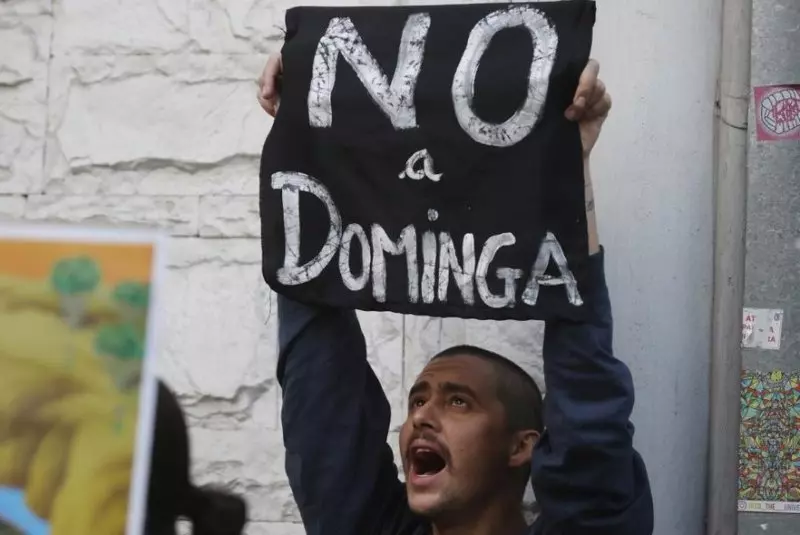

Chile's Supreme Court revives mining project after 12 years of review
Chile's Supreme Court has rejected appeals from President Gabriel Boric's government and environmental groups that seek to block the Dominga mining project.

A protester demonstrates against the controversial Dominga megaproject for the extraction of iron and copper concentrate, outside the Ministry of the Environment, in Santiago, Chile, in January 2023. File Photo by Elvis Gonzalez/EPA UPI
Sept. 19 (UPI) -- After nearly 12 years of review and controversy, Chile's Supreme Court has rejected appeals from President Gabriel Boric's government and environmental groups that seek to block the Dominga mining project.
The potential mine, situated in the Coquimbo region, has been one of Chile's most controversial in recent years because of its proximity to the Humboldt Penguin National Reserve, home to penguins, sea lions and bottlenose dolphins.
It was first submitted for an environmental impact study in September 2013.
The high court's ruling does not give the project a green light to operate, but sends it back to the Committee of Ministers -- made up of the economy, health, energy, mining and agriculture ministries -- that already voted against it three times.
The decision is a blow to the government because it must review the case again and issue a verdict.
Dominga involves a $2.5 billion investment and about 30,000 jobs. It was expected to produce 12 million tons of high-grade iron concentrate and 150,000 tons of copper concentrate annually over a 26 1/2-year lifespan.
"This is a historic ruling, not only for the company but also for the country and its environmental institutions. Dominga is the project with the longest review in the 30 years of the Environmental Impact Assessment System, becoming a true symbol of bureaucracy and judicialization," Andes Iron, the company that owns the project, said after the ruling.
"With this decision, more than 12 years of procedures and litigation come to an end, clearing all legal and technical questions and opening the way for Dominga's construction," the company added. It said the actions of the Committee of Ministers had been irregular, "with legal flaws, unjustified delays and unsupported changes in technical criteria."
The Confederation of Production and Commerce, which represents Chile's business sector, also welcomed the ruling.
"It is a clear confirmation that the project complies with current regulations and with all environmental requirements for its construction and operation," the group's president, Susana Jiménez, said in a statement.
She added that the "long and cumbersome process Dominga has had to face is proof of the urgent need for a more transparent and technical environmental review system -- one that allows projects meeting established requirements to move forward without obstacles."
The government has not given up, however, saying the Supreme Court's ruling "does not imply a final decision on the project," according to the Environment Ministry, one of Dominga's main opponents.
"The Supreme Court also reaffirms that authority to decide on the project lies with the Committee of Ministers, which already issued a decision in January 2025. The Humboldt Archipelago is a unique ecosystem, a heritage of all Chileans, and the Environment Ministry continues to work decisively for its protection," the agency said.
Economic analyst Jorge Berríos, academic director of the Finance Program at the University of Chile's Faculty of Economics and Business, told UPI that Dominga is "a special project, with a strong political component, because it was linked to former President Sebastián Piñera."
In 2010, the right-wing former president sold his stake in the project for $152 million while in office, a period in which he placed his investments in a blind trust.
The sales agreement included a clause stating that the final payment would only be made if the area where Dominga is located was not declared an environmental reserve by the Chilean government -- a condition that was ultimately met.
"From that moment, Dominga took on a political character. The current government does not want it and should be more explicit about that. The company has decided to pursue every legal avenue because it already has its environmental permits," Berríos said.
He added that the conflict highlights Chile's serious institutional problem in approving investment projects.
"If a company has to wait five or 10 years to get a permit, it will think twice and move to another country. This cannot happen because it hurts the country's competitiveness. It has already happened that the forestry company Arauco decided not to invest in Chile but did so in Brazil, where it obtained operating permits in just nine months," Berríos said.
















